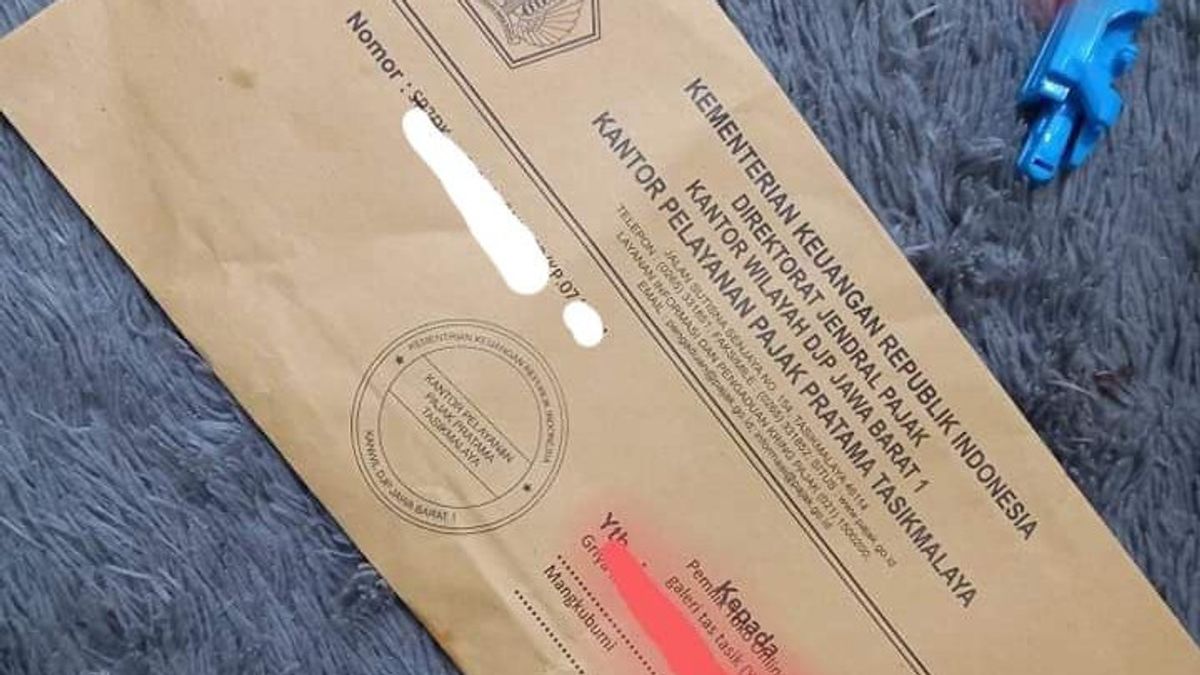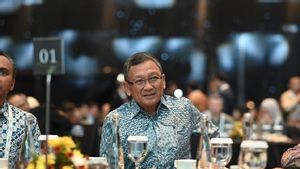
JAKARTA - Twitter social media was shocked by the story of netizens who were selling in e-commerce then suddenly being charged millions of rupiah in taxes. In fact, he admitted that some of his friends had been billed for taxes of up to Rp35 million.
The incident was experienced by Karina Putri Dewi. Through her Facebook account, Karina said that she had to pay several million in taxes. He then appealed to traders in e-commerce to be more careful in calculating the selling price. Do not let the tax component is not included in the selling price.
"Just for information, friends, for those who sell on sh*p*e, I will inform you from now on, take into account the application of the selling price... I have to pay taxes to Pratama for several million. My friend also got around Rp. 35 million," Karina wrote.
Karina's upload is also accompanied by a "love letter" - a tax collection letter from the government. "Hopefully it can be a concern to be smarter in estimating the price we will sell," he said. So what are the actual tax rules imposed on micro, small and medium enterprises (MSMEs)?
MSME TaxOne of the regulations governing MSME taxes is Government Regulation (PP) Number 23 of 2018 concerning Income Tax on Income from Businesses Received or Obtained by Taxpayers with Certain Gross Circulation. This PP is a replacement for PP No. 46 of 2013. PP No. 23 of 2018 sets the Final Income Tax (PPh) rate to 0.5 percent for micro, small and medium enterprises (MSMEs).
Basically PP 23 of 2018 regulates the imposition of Final PPh Article 4 Paragraph (2) for taxpayers with a turnover of up to Rp. 4.8 billion in one tax year. Meanwhile, those who are subject to a 0.5 percent Final PPh rate have a time limit. For individual taxpayers the time limit is 7 years, for corporate taxpayers in the form of cooperatives, limited partnerships (CV), or firms for 4 years, then corporate taxpayers in the form of limited liability companies for 3 years. After that, taxpayers will be subject to corporate income tax at the normal rate of 22 percent or 20 percent for the 2022 tax year.
Meanwhile, tax regulations for traders in e-commerce were previously regulated in the Minister of Finance Regulation Number 210/PMK.010/2018 concerning Tax Treatment of Trade Transactions Through Electronic Systems (E-Commerce). The new provision in this regulation is that traders or service providers are required to notify the Taxpayer Identification Number (NPWP) to the marketplace platform.
Furthermore, this regulation also stipulates that the marketplace platform must report the recapitulation of trade transactions carried out by traders or service providers through the marketplace platform to the Directorate General of Taxes (DGT). However, at the end of March 2019, as quoted by tax.com, the government revoked and declared PMK 210/PMK.010/2018 invalid. The reason, as stated by the Minister of Finance Sri Mulyani Indrawati, is that the regulation is often misinterpreted that the government imposes new taxes for e-commerce players.

In conclusion, the tax imposed for MSME actors, both those who sell online in e-commerce and offline, is a Final Income Tax of 0.5 percent. Then how to calculate it?
Let's say an MSME actor has a turnover of IDR 15 million a month. That amount is then just multiplied by 0.5 percent, which is Rp. 75 thousand. Because paying taxes is accumulated in one year, each final income tax amount is IDR 900 thousand.
Then if you look at the case above, it is possible that why his tax bill is in the millions, it could be that he is in arrears in paying taxes for several years. Not to mention if MSME actors do not report their financial statements, this can be subject to administrative sanctions.
As quoted by tax.go.id, in the MSME Final PPh, the date of payment is also considered the date of reporting the annual notification letter (SPT) for the Final PPh Period. Then if the MSME actors are late in paying, they will receive an administrative sanction in the form of interest of 2 percent per month (maximum 24 months) of the late payment value. In addition, taxpayers will also be subject to administrative sanctions in the form of a fine of Rp. 100,000 for late reporting of the Final PPh Period SPT.
That's where the problem lies. Therefore, it is not surprising if the MSME taxpayers who do not report and deposit their taxes can be subject to a fairly large bill.
Seeing what happened to Karina, netizens' responses varied. Some hope that other administrative services in Indonesia will be just as fast when the government collects taxes.

Indeed, there are still many people who feel that taking care of administration in Indonesia is both long and complicated. It was even discovered by the Ministry of Home Affairs himself recently.
The Director General of Population and Civil Registration (Dukcapil) of the Ministry of Home Affairs, Zudan Arif Fakrulloh, once sent an undercover team to nine sub-districts in South Jakarta and East Jakarta. As a result, there are still many Disdukcapil that add a myriad of requirements for managing population documents.
According to Zudan, as quoted by CNNIndonesia, there were three teams that went directly to nine urban villages in Jakarta, namely North Gandaria, North Cipete, and Melawai in South Jakarta. Then in the Kelurahan Bambu Apus, Setu, Cilangkap, Ciracas, Cibubur, and Kelapa Dua Wetan in East Jakarta.
The team then asked about the requirements for managing population documents ranging from birth certificates, death certificates, to reports of moving to Jakarta. As a result, the team found an additional requirement of up to 23 types just to process a death certificate.
"It happened in Cibubur and Setu Villages, East Jakarta with 18 additional requirements for death certificate documents," said Zudan. Zudan said, in addition to many additional requirements, the team also reported findings regarding additional requirements that were not in accordance with regulations. He said the requirements were different between kelurahan.
"Meanwhile, services that are in accordance with the provisions, namely the management of KK and KIA. Likewise, the use of the application form is in accordance with the regulations, which previously disguised the forms that did not comply with the new regulations," he said.
The findings were later confirmed by Acting Head of the DKI Jakarta Dukcapil Office, Budi Awaluddin. He said his party had evaluated the results of the inspection.
Budi said, still quoted by CNNIndonesia, his party will provide socialization and guidance to all officials to carry out community services, from the provincial to the sub-district level. This socialization is related to population service administration guidelines according to Presidential Regulation 96 of 2018 concerning Requirements and Procedures for Population Registration and Civil Registration and Minister of Home Affairs RI 108 of 2019 concerning Implementing Regulations of Presidential Regulation Number 96 of 2018.
*Read more information about VIRAL, read another interesting article from Ramdan Febrian Arifin.
Other BERNASThe English, Chinese, Japanese, Arabic, and French versions are automatically generated by the AI. So there may still be inaccuracies in translating, please always see Indonesian as our main language. (system supported by DigitalSiber.id)








